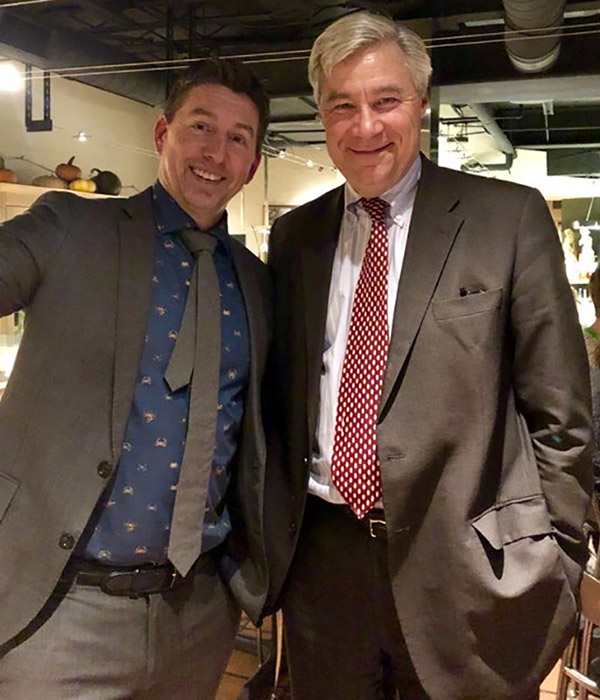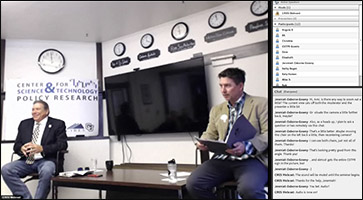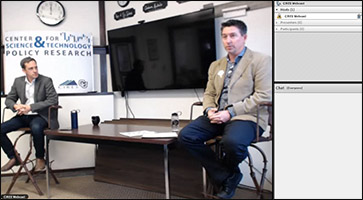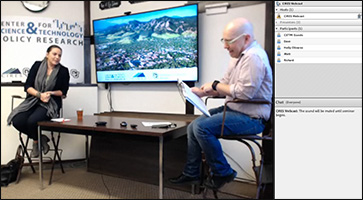Center News |
|
Climate Change Already Damaging Health of World’s Children, Threatens Lifelong Impact |
|
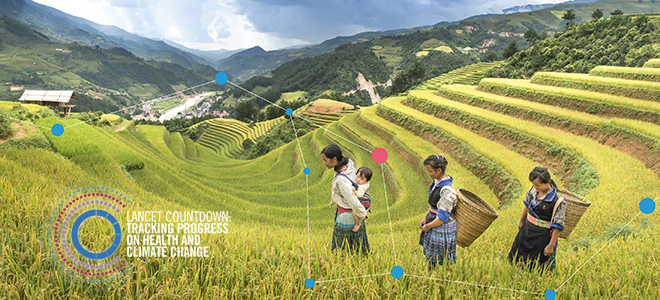 |
|
CSTPR’s Max Boykoff and Olivia Pearman were one of over 60 experts from around the world that contributed to the 2019 Lancet Report on Health and Climate Change. The authors say every child born today will be affected by climate change. How we respond will shape the health of children across the globe, at every stage of their lives. CIRES News. Climate change is already damaging the health of the world’s children and is set to shape the wellbeing of an entire generation unless the world meets Paris Agreement targets to limit warming to well below 2C, according to a major new report published in The Lancet. “It’s important to better understand the links between climate change and public health,” said CIRES fellow Max Boykoff, who contributed to the report with an investigation into media coverage of climate change and public health. “They demonstrate the immediacy of these intersecting challenges—we must approach with careful urgency to alleviate their negative impacts.” The Lancet Countdown on Health and Climate Change is a comprehensive yearly analysis tracking progress across 41 key indicators, demonstrating what action to meet Paris Agreement targets—or business as usual—means for human health. The project is a collaboration between 120 experts from 35 institutions including the World Health Organisation (WHO), World Bank, University College London, Tsinghua University, and the University of Colorado Boulder. The report highlights key climate change-related impacts:
“This year, the accelerating impacts of climate change have become clearer than ever,” says Professor Hugh Montgomery, Co-Chair of The Lancet Countdown and Director of the Institute for Human Health and Performance at University College London. “The highest recorded temperatures in Western Europe and wildfires in Siberia, Queensland, and California triggered asthma, respiratory infections and heat stroke. Sea levels are now rising at an ever concerning rate. Our children recognize this Climate Emergency and demand action to protect them. We must listen, and respond.” For the world to meet its UN climate goals and protect the health of the next generation, the energy landscape will have to change drastically, and soon, the report warns. Nothing short of a 7.4% annual cut in fossil CO2 emissions from 2019 to 2050 will limit global warming to the more ambitious goal of 1.5C. According to Boykoff, tracing media coverage of these issues helps to put our finger on the pulse of public discussions about their interactions and threats to human-environment wellbeing. “We find that in newspapers across the world don’t tend to report health and climate change as interconnected issues,” said Olivia Pearman, a PhD student working with Boykoff and another coauthor on the report. “While coverage of these issues together has been increasing in recent years, this observation speaks to the need for continued, sustained recognition and discussion of the interactions between human health and the environment.” This press release has been modified from Lancet Communications. Read more here. | |
Boulder Visit with Senator Whitehouse |
|
On Tuesday, October 8 a small group of University, City of Boulder, and local leaders gathered for a productive conversation with visiting Rhode Island Senator Sheldon Whitehouse. During this past Congressional recess, Senator Whitehouse traveled to Colorado and visited us here in Boulder as he was interested in learning more about what we are doing at the University of Colorado, in the City, and in our part of the Front Range of Colorado. Senator Whitehouse has been working tirelessly over the past several years, working first-hand with scientists, policymakers, and state officials on how to most effectively address climate change. The Center for Science and Technology Policy Research (CSTPR) within the Cooperative Institute for Research in Environmental Sciences, helped facilitate the gathering with support from the University of Colorado Office of Government Affairs. Colorado was the 18th state that Senator Whitehouse has visited during short Congressional recesses. He has been motivated to pursue these opportunities as they provide him information to take back to Washington D.C. and talk with his colleagues about the threat of climate change happening today in various places. |
CSTPR Director, Max Boykoff, with Senator Sheldon Whitehouse. |
Beth Osnes Named CU Assett Faculty Advisor |
|
University of Colorado Boulder’s Art and Sciences Support of Education Through Technology (ASSETT) has just announced Beth Osnes as a new faculty advisor. An Associate Professor of Theatre, Beth brings to the position a long history of innovative and unique projects involving students, technology, and faculty from other disciplines, particularly faculty involved in environmental studies. See, for example, several projects she has completed with Inside the Greenhouse and Speak World. Beth has worked with ASSETT on projects designed to help her students express themselves through video and through educational technologies. Most recently, she has served as ASSETT Advisory Board. She is actively involved in our Innovation Incubator as a member of a team that is investigating opportunities to establish a peer-to-peer support environment for faculty and students, and she is excited to help Amanda McAndrew with ASSETT’s Faculty Fellows program. |
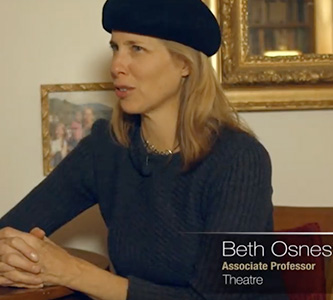 |
Public Discussions on Climate Policies with Colorado State Senators |
|
In the fall of 2019, Colorado State Senators came to the University of Colorado to participate in the first of CSTPR’s seminar series “Public Discussion: Policies on Climate and Environment” (co-Hosted with the Benson Center for the Study of Western Civilization). The discussions were recorded and can be viewed on our website. October 9: Colorado Senator Ray Scott (R – Grand Junction)
|
|


